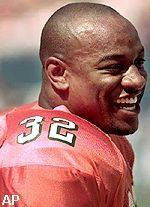
Jarrett Payton Dedicating Season To His Father
Nov. 16, 1999
By MARK LONG
Associated Press Writer
CORAL GABLES, Fla. – Every time Jarrett Payton would see his father, hecould expect the same greeting. “Where have you been?” Walter Payton jokinglywould ask.
Those were the last words the Hall of Fame running back had for his son.
Jarrett, returning to Walter Payton’s bedside the day before he died, wasgreeted with the phrase that had become so familiar from the man Jarrett callshis father and best friend.
“He looked at me and said, ‘Where have you been?’ and I said, ‘Things neverchange,”‘ Jarrett said Tuesday, the first time he has answered questions abouthis father since his death Nov. 1. “He just laid back and smiled and that wasreally it.”
Jarrett, a backup running back for the Miami Hurricanes, has dedicated theremainder of this season to his father. He changed his number from No. 32 toNo. 34, the same number his father wore during 13 seasons with the ChicagoBears.
Wearing a white Bears T-shirt Tuesday, Jarrett said the change is permanent.Though he never wanted to wear his father’s number, he wore No. 12 on thesoccer field because “three times four equals 12.”
“It felt good for me to put it (No. 34) on,” Jarrett said. “My wholefamily liked it a lot because they say they see so much of my dad in me.”
Jarrett, a freshman, returned to school two days after his father’s funeralbecause he knew that is what Walter Payton would have wanted.
But Jarrett still is struggling to cope with his father’s death.
Jarrett said his father wrote him a long letter in the final month beforehis death. Jarrett could not bring himself to read – or even open – it when hewas home.
Jarrett said he wants to be able to read the letter when he returns home forChristmas.
“I guess it’s pretty deep, it’s certain stuff he wants me to do andachieve, so I can’t wait to get that,” Jarrett said. “Right now, though, I’mstill trying to get over this whole thing with him. He was my best friend andit’s kind of hard when you lose your best friend and your father at the sametime. It’s a big piece of me.
“I know I have a lot more stuff to accomplish in my lifetime, and knowingthat he won’t be here physically to watch me do it, it hurts me a lot, becauseI still feel that he was too young and there was a lot of time left for him. Hestill wanted to do a lot. And the things that he’s not going to be able to do,I’m going to take on my behalf to do for him.”
Walter Payton disclosed in February that he had the rare liver diseaseprimary sclerosing cholangitis and needed a liver transplant. He learned duringan examination in May that he had cancer of the bile duct, a vessel thatcarries digestive fluids from the liver to the small intestine.
The news devastated Walter Payton, who thought he was nearing the pointwhere he would be eligible for a transplant. Instead, he went home to facedeath. His kidneys shut down and he was given 24 to 48 hours to live but livedsix more days. He was 45.
Jarrett said his mother, Connie Payton, called him home Sunday, Oct. 24. Itwas Jarrett’s fourth trip home since beginning his freshman year at Miami inAugust.
“Being able to spend time with my father for that week was unbelievableeven though he wasn’t the same guy that you’d always come home to and talk toand have conversations with,” Jarrett said.
“I was right next to him and I was holding his hand when he passed. Icouldn’t cry, because I knew what he had gone through and the way he had beenfighting, and I just knew that he was in a better place. It made me feel goodto know that he didn’t die some horrible death where he was struggling. It wasthe most peaceful thing I’ve ever seen in my entire life.”
Jarrett is glad to be back at school, even though he said he gets looks frompeople who seem to want to say something but just do not know how to say it.
Hurricanes coach Butch Davis said the school has offered Jarrett theservices of a sports psychologist who can help him through the grievingprocess.
“Obviously he’s got a lot of things to work through and to deal with,”Davis said. “But hopefully by putting himself back into a routine, now he’sgot studies to think about, he’s got football, he’s got his friends in the dormroom and people to be around, it will help.”






